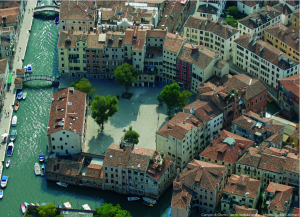VENICE AND THE GHETTO A Place of Social Integration
Surely, the creation of the Ghetto of Venice was not an act of social integration; it was imposed by the Republic of Venice 500 years ago, in an attempt to stem the increasing inflow of Jewish people who were trying to escape from the War of the League of Cambrai.
In spite of the regular connections with the city, life inside this close area was characterized by strict rules. At sunset gates were shut, so as to prevent people from leaving, and, during daytime, they could go out only wearing a distinctive sign which would allow their identification as Jewish people. In exchange for this treatment, Jewish people gained freedom of worship, including the right of building their synagogues and praying on their Books, and protection from war. It was a forced marginalization, but it safeguarded the values of a particular community, which created and shielded an important historic and artistic heritage; the isolation did not prevent Jewish scholars from profitably collaborating with Christian intellectuals.
Napoleon’s seizure of power led to the downfall of the Republic of Venice, which let Jewish people become fully recognized citizens; consequently, they could live everywhere in the city. Those who could afford another accommodation gradually abandoned their houses inside the Ghetto and, at the beginning of the 20th century, the quarter became a wretched area. The rediscovery of the Ghetto and the acknowledgment of its great artistic value is quite a recent thing, after the dark ages of racial persecutions and deportations, which caused lots of deaths in Venice. Nowadays, the Ghetto is one of the most visited places in the city, and the City of Venice is proud of what has been and will be done in order to spread our Jewish fellow citizens’ history, heritage and traditions, maintaining our policy of respect and inclusion towards all our citizens.
*Luigi Brugnaro is the mayor of Venice. This article has been translated by Ilaria Modena, student at the Scuola superiore interpreti e traduttori di Trieste, who is doing her apprenticeship in the newsroom of Pagine Ebraiche.

